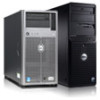Dell PowerEdge M420 Dell PowerEdge M620 Systems Owner's Manual - Page 49
Hard Drives, Hard Drive Installation Guidelines, Removing A Hard Drive
 |
View all Dell PowerEdge M420 manuals
Add to My Manuals
Save this manual to your list of manuals |
Page 49 highlights
NOTE: Do not over-tighten the heat sink retention screws when installing the heat sink. To prevent over-tightening, tighten the retention screw until resistance is felt, and stop once the screw is seated. The screw tension should be no more than 6 in-lb (6.9 kg-cm). 7. Install the cooling shroud. 8. Close the blade. 9. Install the blade in the enclosure. As the system boots, it detects the presence of the new processor and automatically changes the system configuration information in the System Setup. 10. Press to enter the System Setup and check that the processor information matches the new system configuration. 11. Run the system diagnostics to verify that the new processor operates correctly. 12. Update the system BIOS. Hard Drives • The system supports up to two 2.5 inch SAS or SATA hard drives. • All drives connect to the blade system board through the SAS/SATA backplane board. • Hard drives are supplied in special hot-swappable drive carriers that fit in the hard-drive bays. • SAS/SATA hard drives cannot be mixed within a blade. Hard Drive Installation Guidelines For a single hard-drive configuration, a hard-drive blank must be installed in the other drive bay to maintain proper cooling airflow. Removing A Hard Drive NOTE: Not all operating systems support hot-swappable drive installation. See the documentation supplied with your operating system. 1. Take the hard drive offline and wait until the hard-drive indicator codes on the drive carrier signal that the drive may be removed safely. When all indicators are off, the drive is ready for removal. See your operating system documentation for more information on taking the hard drive offline. 2. Open the hard-drive carrier handle to release the drive. 3. Slide the hard drive out until it is free of the drive bay. If you are permanently removing the hard drive, install a blank insert. 49















